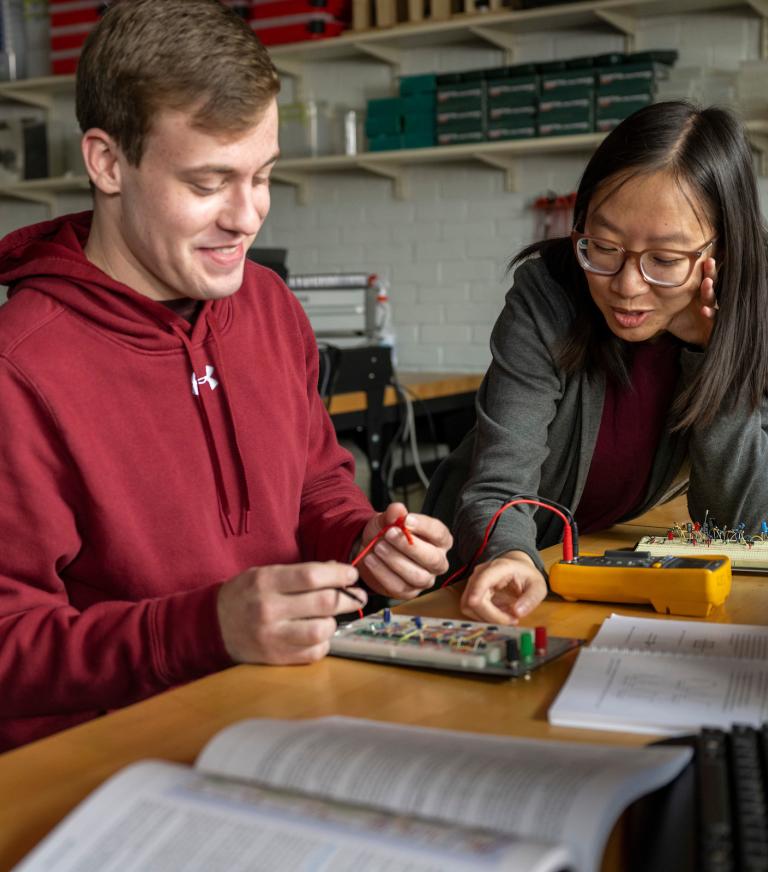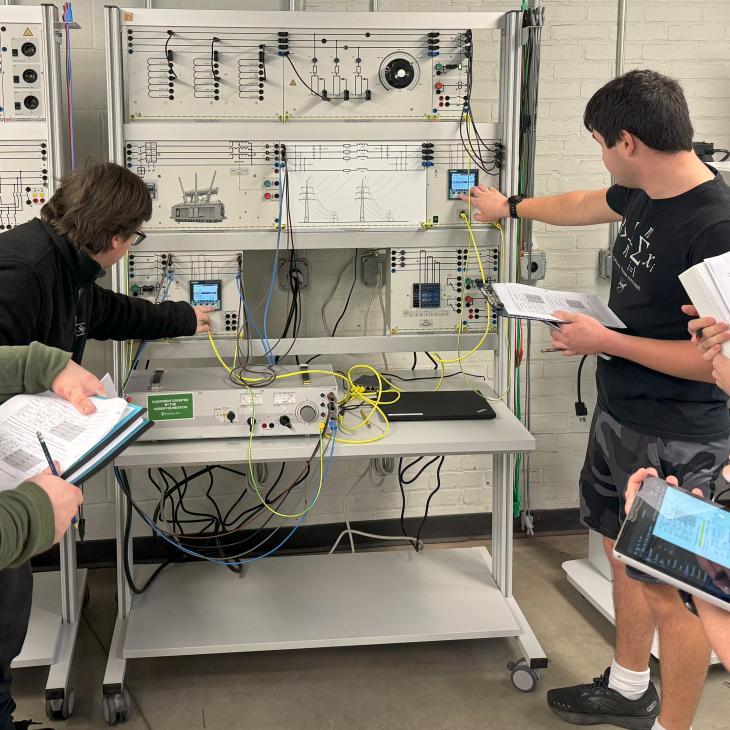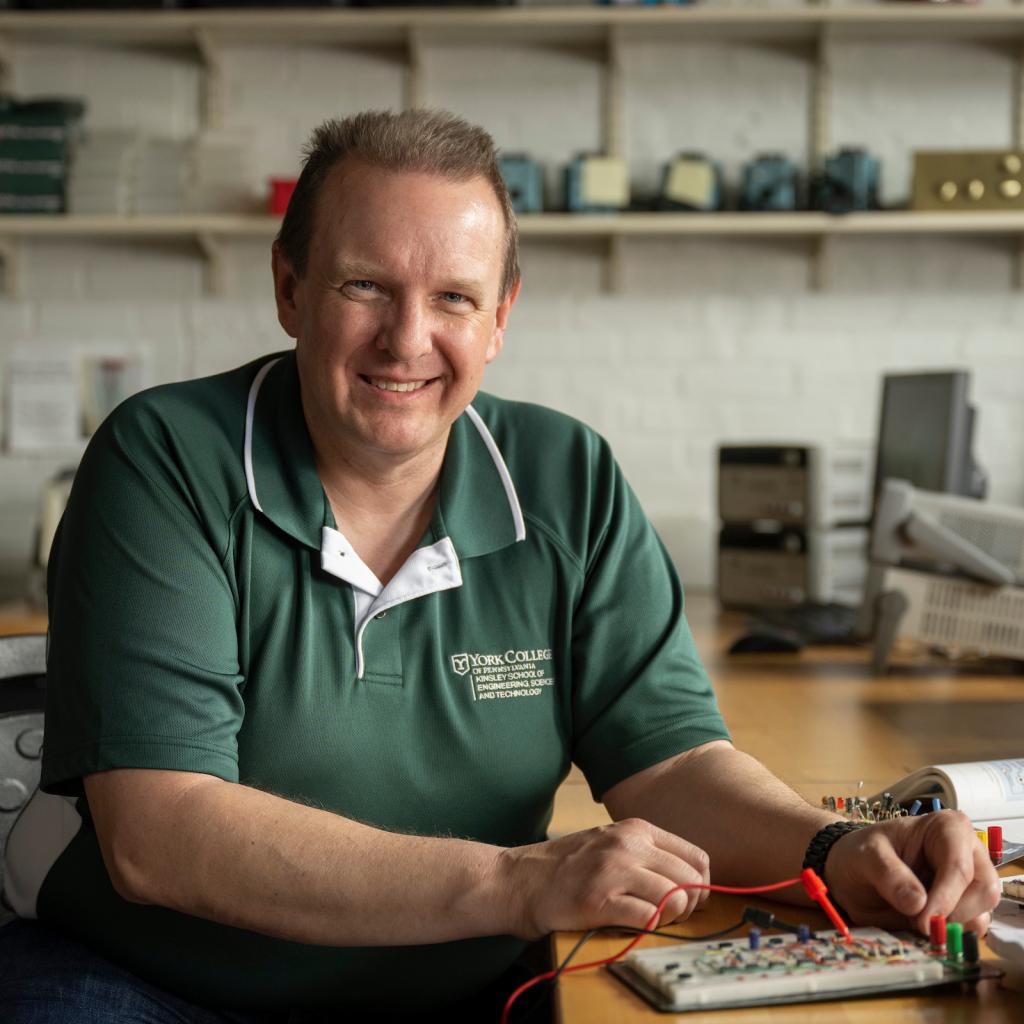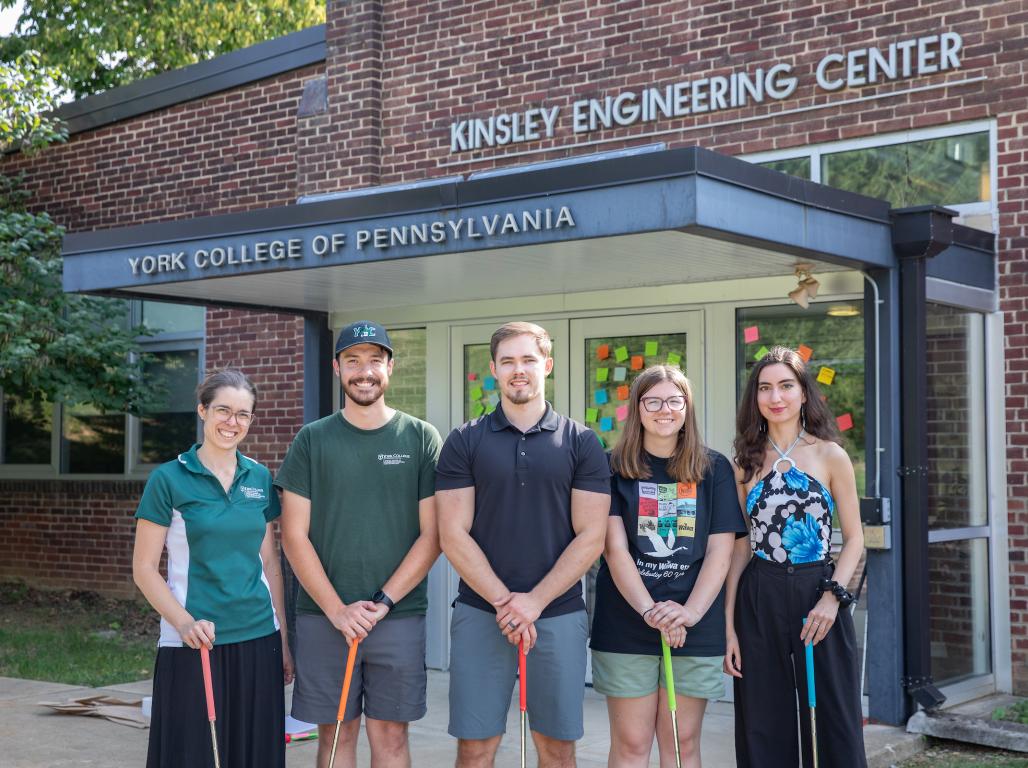Electrical Engineering

Program Type
B.S.
Est. Time to Complete
4 Years
School
Kinsley School of Engineering, Sciences and Technology
Delivery Mode
On Campus

Electrical engineering skills are in demand in nearly every industrial and technological sector.
York College of Pennsylvania’s Bachelor of Science (B.S.) in Electrical Engineering degree program is a hands-on major that produces career-ready graduates sought after by top companies and employers nationwide.
Backed by training in specialized labs and a two semester-long engineering co-op experience, students in our ABET-accredited Electrical Engineering program use mathematics and science to design devices, systems, and processes in real-world engineering roles with local employers.
As an Electrical Engineering major at York College, connect with highly respected faculty in the field and prepare to work in sectors ranging from power and energy, manufacturing, robotics, consumer electronics, and more.
About the Bachelor of Science in Electrical Engineering
Electrical Engineering Degree Requirements
The Bachelor of Science in Electrical Engineering program starts with essential courses in mathematics and computer science and progresses to foundational and advanced topics in electrical engineering. Core Electrical Engineering major requirements include digital and analog circuit design, control systems, signal processing, and power systems and electronics.
General education classes, hands-on lab work, and a two-semester capstone design project complement traditional coursework, while cooperative work experiences (co-ops) provide invaluable industry exposure.
Electrical Engineering courses you may take include:
- ECE 100: Introduction to Electrical Engineering
- ECE 280: Fundamental of Electrical Engineering
- ECE 315: Power Systems and Electronics
- ECE 370: Microprocessor System Design
- EGR 290: Engineering Career Training and Preparation
Students can specialize through elective courses in areas like software engineering, embedded systems, and communication systems.
Admissions and Aid
Start on the path to some of the more rewarding career opportunities today and review undergraduate admission requirements. Our rolling admissions policy means you can apply at any time.
Our rich academic and campus experiences cost much less than what students pay at other private colleges. Learn more about tuition costs and financial aid opportunities at York College.
Earn a B.S. in Electrical Engineering at York College of Pennsylvania
Turn your passion for tinkering with electronics into a rewarding engineering career with York College of Pennsylvania’s Bachelor of Science in Electrical Engineering degree program, where top engineers mentor you through a two-semester co-op.
Take the first step today and request more information. Or, begin your application.
Career Opportunities with a B.S. in Electrical Engineering
Electrical engineering is a dynamic and continually evolving field, and a bachelor’s degree opens the door to a range of career opportunities. Electrical Engineering majors at York College become well-prepared to enter a variety of sectors, including electronics, power generation, renewable energy, communication systems, robotics, and embedded systems, among others.
The technical knowledge, problem-solving skills, and practical co-op experience help graduates to excel in roles such as:
- Automotive Engineer
- Communications Engineer
- Control Systems Engineer
- Electronics Design Engineer
- Engineering Consultant
- Field Engineer
- Industrial Automation Engineer
- Power Systems Engineer
- Robotics Engineer
Readiness for Graduate and Professional Study
Our graduates have successfully transitioned into rewarding careers with leading companies, research institutions, and government agencies. For some advanced positions requiring further education, the Electrical Engineering major at York College opens doors to immediate engineering opportunities and lays a strong foundation for further study and specialization through graduate education.
Salary Outcomes for Electrical Engineering Majors
The professional benefits of an electrical engineering degree include growth potential and the ability to work across diverse industries, and the potential salaries with a bachelor’s in electrical engineering reflect the in-demand nature of this field and skills in these areas to employers.
According to the Bureau of Labor Statistics, electrical engineers report a six-figure median annual salary. This breaks down to the following figures based on industry and specialty:
- Electrical engineers—$106,950/year
- Electrical and electronic engineers—$109,010/year
- Electronics engineers (except computer)—$119,200/year
The most lucrative industry to work in as an electrical engineer is research and development in the physical, engineering, and life sciences, followed by semiconductor and electronic component manufacturing.
Co-Op Work Experience
Kinsley School of Engineering, Sciences, and Technology places immense value on our undergraduate engineering cooperative education (co-op) program, where students complete two working semesters, seamlessly integrated into the four year engineering curriculum.
This essential component ensures students are ready for more advanced academic challenges and gain firsthand insight into their future careers. Through these real-world experiences, students can intimately understand the day-to-day realities of the electrical engineering field and experience benefits, including:
- Financial Support: Engaging in paid professional roles during co-op semesters helps offset college expenses.
- Professional Skill Exposure: Early interaction with practicing engineers offers opportunities to sharpen their technical and interpersonal skills.
- Competitive Advantage: Applying coursework in practical experiences and gaining professional connections create sought-after graduates.
The carefully structured co-op program equips our Electrical Engineering majors with the tools, knowledge, and experience to excel in both their academic and professional journeys.
Capstone Design
The Electrical Engineering major program provides opportunities to work hands-on in engineering laboratories nearly every day, culminating in ECE 400/402: Capstone Design I/III. In this senior-level course sequence, students engage in a real-world multidisciplinary design and build experience, operating on a team to deliver a prototype of the design effort and present a report on its development and results.
Research Alongside Expert Faculty
In coursework, independent study opportunities, and the supervised capstone design project, Electrical Engineering majors interact with York College faculty who are leading-edge researchers with years of industry experience.
Students may partner with faculty members on research projects that often lead to publications at national and international conferences. Former students helped design and build swarm robotics, a radio telescope, an automated greenhouse, drones, medical devices, and more.
Top Facilities and Technologies
The Kinsley Engineering Center houses collaborative engineering labs, computer labs, maker spaces, and places to connect with other engineering students. With the understanding that engineering innovation arises when different disciplines interact, engineering majors at York College enjoy seven different laboratories related to various subject areas such as robotics, power systems, communications and signal processing, and several others.
Explore the Kinsley Engineering Center and dedicated engineering laboratories.
Clubs and Professional Organizations
Our on-campus chapter of the Institute of Electrical and Electronics Engineers (IEEE) provides student members with a variety of activities and social events, including attending regional meetings.
Enjoy ample opportunities to join, not just professional societies, but student-led clubs. Whether it’s getting involved in student government opportunities, multicultural organizations, or the Women in Science and Engineering (WISE) Club, York College has a wide variety of clubs and organizations to connect with other students.
Skills for In-Demand Electrical Engineering Careers
Graduates of York College’s Electrical Engineering major program are proficient in electrical engineering principles and skilled in problem-solving, innovation, and communication, preparing them for successful careers in electrical engineering and related fields.
Graduates of the B.S. in Electrical Engineering hold:
- In-depth understanding of core principles and applications in electrical engineering
- Analysis skills for decoding complex engineering problems and designing solutions that meet specifications
- Hands-on experience in applying theoretical knowledge to practical scenarios, including experimentation and use of modern engineering tools
- A broad knowledge of related fields, including computer science, physics, and mathematics, supporting the interdisciplinary nature of engineering
- Real-world industry experience through co-op positions
- Skills in identifying, formulating, and solving engineering problems with innovative and creative thinking
- Ability to effectively communicate technical information and work collaboratively in multidisciplinary teams
Minors and Related Degrees
York College’s interdisciplinary offerings can complement the B.S. in Electrical Engineering and tailor students’ elective study and professional experiences to emerging career fields and areas related to engineering. Popular choices include:
ABET-Accredited Electrical Engineering Program
The B.S. in Electrical Engineering degree program is accredited by the Engineering Accreditation Commission of ABET, https://www.abet.org, under the commission’s General Criteria and Program Criteria for Electrical Engineering.

ABET is a nonprofit, non-governmental agency that accredits programs in applied and natural science, computing, engineering, and engineering technology. ABET accreditation provides assurance that a college or university program meets the quality standards of the profession for which that program prepares graduates.
Electrical Engineering Courses
Your class schedule will include core courses for your major, Gen Next general education classes, and electives.
| Course Name | Course Code | Credits |
|---|---|---|
| Design and Analysis of Analog Circuits | ECE 310 | 4 Credits |
| Power Systems and Electronics | ECE 315 | 3 Credits |
| Introduction to Signal Processing | ECE 332 | 4 Credits |
| Communication Networks | ECE 334 | 3 Credits |
| Electromagnetic Fields | ECE 350 | 3 Credits |
| Microprocessor System Design | ECE 370 | 3 Credits |
Careers in Electrical Engineering
A bachelor's degree in Electrical Engineering opens up a variety of career opportunities. Some of your options may include:
Automated Manufacturing Systems
Robotics and Consumer Electronics
Power Generation, Transmission, and Conversion
Signal Processing and Communication Systems
Computer Hardware, Embedded Control Systems

Build your dream career, one day at a time.
This is day one. From your first semester on campus through graduation day, York College offers expert advice, professional development opportunities, and personalized support to help you navigate the choices that influence your future.
Explore resources for a successful college experience:
Frequently Asked Questions
Yes, electrical engineering is an excellent major for those interested in technology, innovation, and problem-solving, offering a solid foundation in designing, analyzing, and improving electrical systems, from consumer electronics to large-scale power networks.
This major provides a challenging and rewarding academic experience and opens up diverse career opportunities with competitive salaries and the potential for significant contributions to society and technological progress.
To become an electrical engineer, you typically need a Bachelor of Science (B.S.) degree in Electrical Engineering. This undergraduate program covers fundamental and advanced topics in electrical engineering, including circuits, digital systems, electromagnetism, and power engineering.
It also includes practical laboratory work and design projects to prepare graduates for the field. For more specialized roles or research positions, a master's or doctoral degree in electrical engineering or a related field might be required.
An electrical engineering degree offers versatile career paths beyond traditional roles. Graduates can venture into renewable energy, robotics, telecommunications, automotive, aerospace, and research and development. The degree also equips individuals with problem-solving and analytical skills applicable in teaching, business consulting, finance, and entrepreneurship, showcasing the broad applicability of the skills acquired.
Meet the Faculty
View All FacultyElectrical Engineering in Action
View All NewsRelated Programs
Civil Engineering
The Bachelor of Science (BS) in Civil Engineering degree program at York College of Pennsylvania is the first step in a career with a meaningful daily impact on the everyday lives of people across the globe. Position yourself at the forefront of creating and maintaining the physical frameworks of our communities, such as roads, bridges, airports, tunnels, dams, and essential water and sanitation systems.
Computer Engineering
Computer engineers draw upon mathematics, science and computer science to design computer or microprocessor controlled devices, systems and processes. At York College, we focus on embedded systems, which are customized, standalone systems under computer/microprocessor control. You’ll get to work right away with freshmen year design project — learning by doing is how we approach education.
Mechanical Engineering
Students in York College of Pennsylvania’s Bachelor of Science (BS) in Mechanical Engineering degree program learn by doing, starting their first year. Mechanical Engineering majors gain fantastic real-world experience and even income through a three-semester co-op program with top employers locally and nationally.








